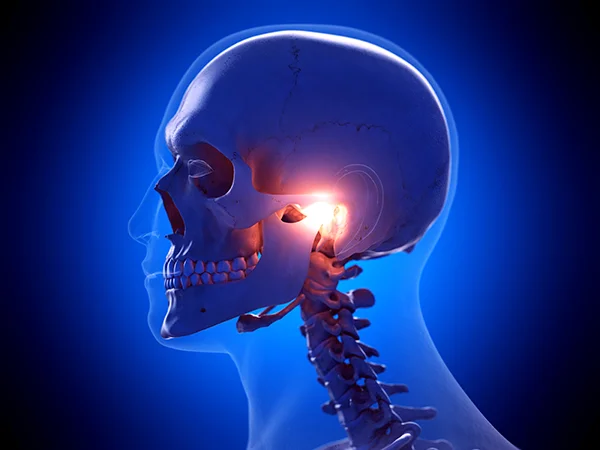TMJ Temporomandibular joint disorders (TMD), often referred to as TMJ, affect the jaw joint and surrounding muscles, leading to discomfort and functional issues. The temporomandibular joint connects the jawbone to the skull, allowing for movement necessary for speaking, chewing, and facial expressions. Temporomandibular joint disorders (TMD), often referred to as TMJ, affect the jaw joint and surrounding muscles, leading to discomfort and functional issues. The temporomandibular joint connects the jawbone to the skull, allowing for movement necessary for speaking, chewing, and facial expressions.What Is TMJ/TMD?TMJ/TMD encompasses a range of disorders affecting the jaw joint and its associated muscles. Commonly, it results in pain, restricted jaw movement, and clicking or popping sounds when moving the jaw. While TMJ refers specifically to the joint itself, TMD refers to the broader group of disorders that can arise from issues with the joint or muscles. Common symptoms of TMJ/TMD include:
How Is TMJ/TMD Diagnosed?Diagnosis typically involves a thorough evaluation by a dentist or healthcare professional. This process includes:
Treatment Options for TMJ/TMDThe treatment for TMJ/TMD varies depending on the severity of the condition and underlying causes. Common treatment options include:
Recovery InformationRecovery from TMD treatment varies based on the approach taken. Many individuals experience improvement within a few weeks with conservative treatments like lifestyle changes, physical therapy, and medication. More invasive treatments may require longer recovery times, particularly if surgery is involved. How Long Does Treatment Last?The effectiveness of TMJ/TMD treatment can vary widely. Many patients find relief from symptoms through conservative treatments that can last for months or even years. However, some individuals may experience recurring symptoms, necessitating ongoing management or periodic reassessment of their treatment plan. TMJ/TMD is a complex condition that can significantly affect daily life. Understanding the causes, symptoms, and treatment options available is crucial for managing this disorder effectively. By working closely with healthcare professionals and adopting appropriate lifestyle modifications, individuals can find relief from TMJ/TMD symptoms and improve their quality of life. Early intervention and consistent care play a key role in achieving long-term success and preventing further complications. Schedule Your Appointment today!If you are interested in learning more about our services, please call (971) 374-5600, and schedule your appointment today! |